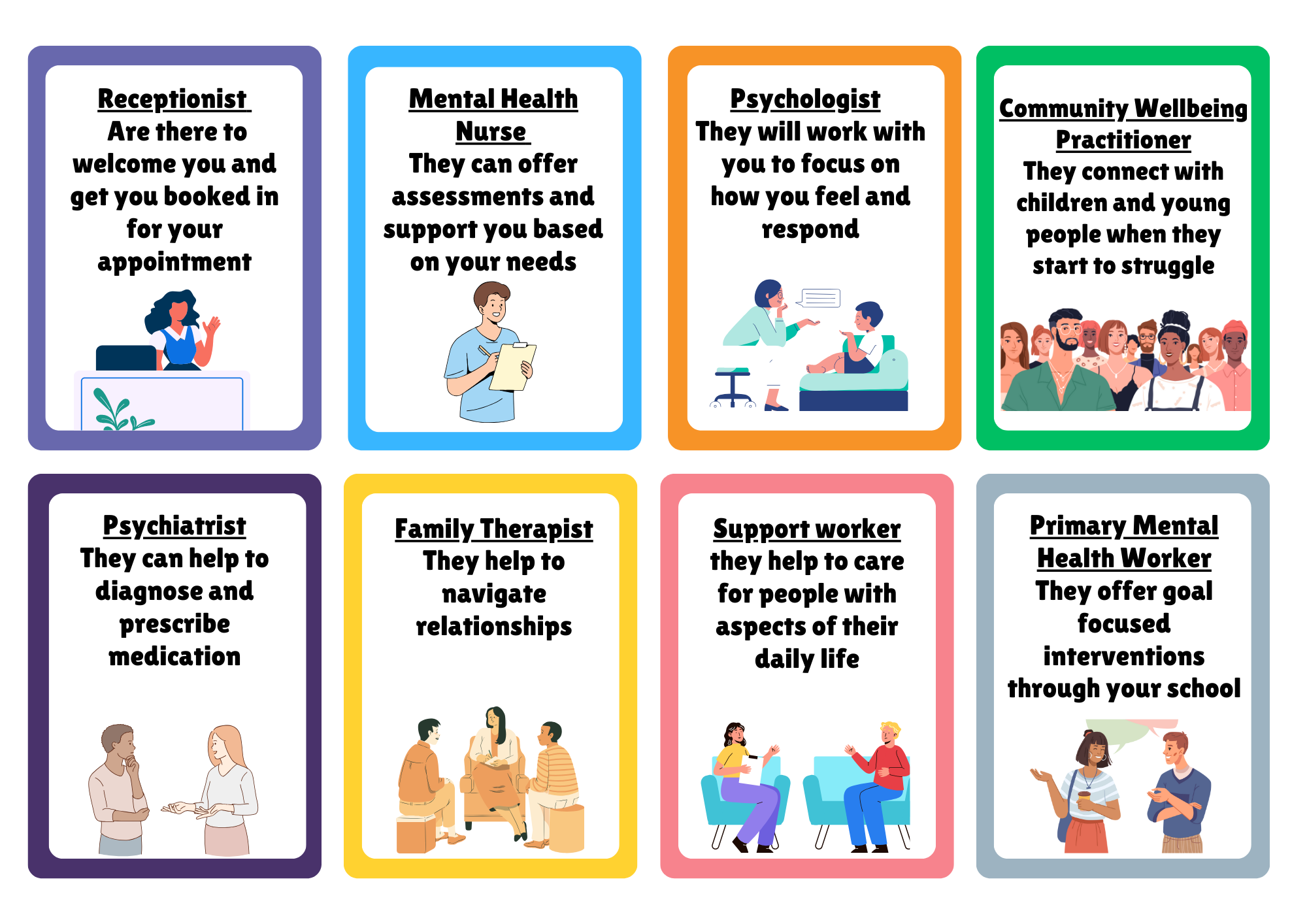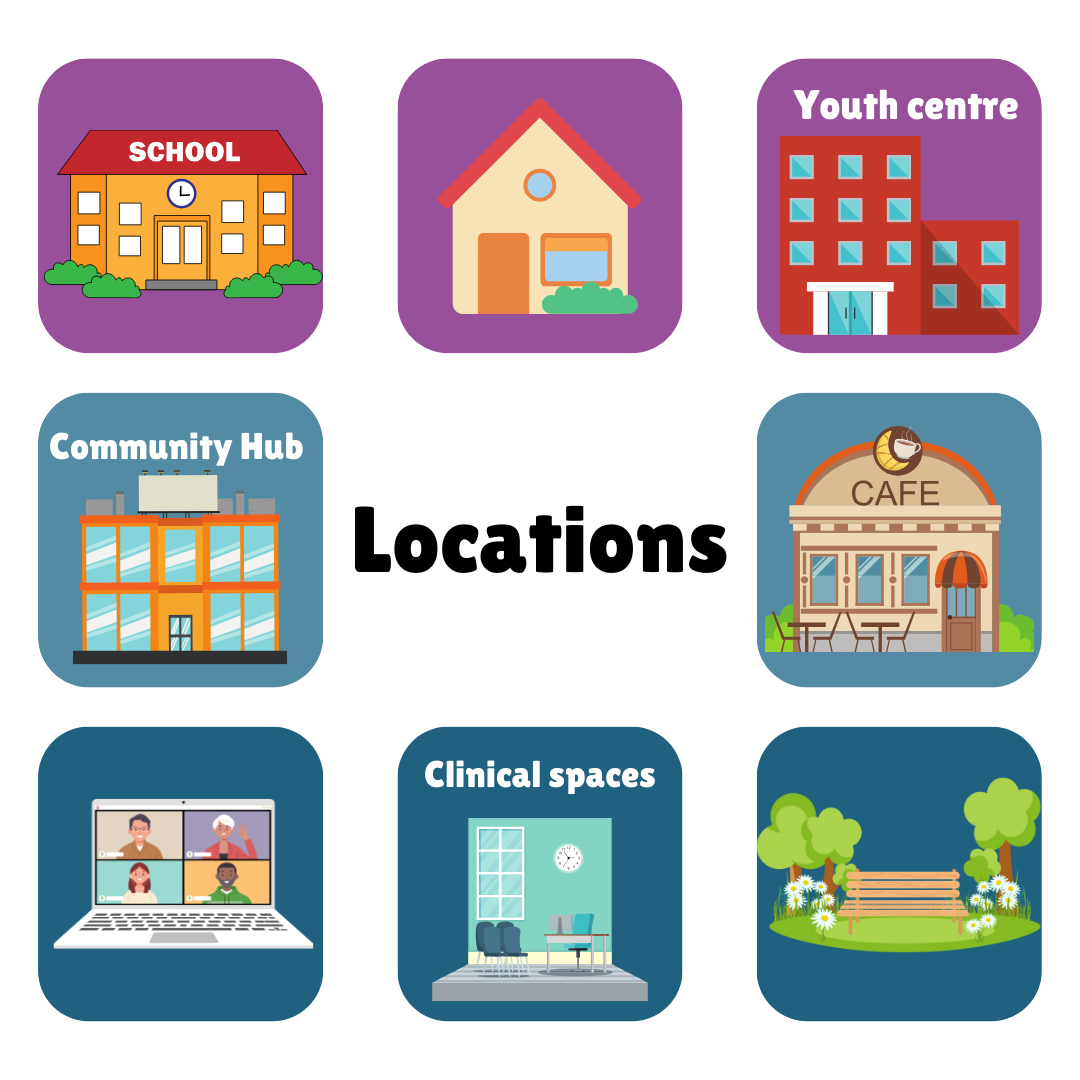What this page is about
If you have an appointment with a service under Mindworks Surrey and are wondering what to expect - this page can support you with your different questions and queries.
Types of support available to you
There are many different types of support available through Mindworks Surrey. Below are some types of support that may be offered to you either on a one-to-one basis or with other children and young people. The type of support is decided by you and/or your parent or carer and will be based on your needs, based on our THRIVE model. We will work with you to establish how your needs can be best supported and who can provide that support for you, this might be through our Mindworks partners or delivered outside of Mindworks.
- Guided self-help - is where you work through workbooks/ worksheets to support your learning on different tools and techniques that can improve your mood. This is something that you may do yourself or alongside a practitioner.
- Cognitive Behaviour Therapy (CBT) - is a talking therapy that can help you change the way you view and manage problems.
- Counselling - is a talking therapy that involves a trained counsellor listening to you and supporting you to find alternative ways of dealing with things you identify.
- Family therapy - can help those in close relationships to better understand and support each other.
- Trauma-focused therapy - is a specific approach to therapy that looks at how a stressful, frightening or distressing experience may be difficult to cope with and ways in which to support yourself through it.
- Art therapy - is where you use art to explore your thoughts and feelings.
- Crisis support - accessing support when feeling extreme emotional distress or in a crisis
- Groups - are interactive sessions that focus on specific topics and these are usually held with other children and young people.
The support that you have been offered may not be in the list above and your practitioner will be able to speak to you about what you are being offered and how this may support your needs.
Who you might meet
Below are examples of who you might meet whilst you are at your appointment. All those involved in your support will introduce themselves and tell you about what they do and how they will be supporting you.

You may also meet:
- Youth workers - they build voluntary, trusted relationships with young people to support them in their development.
- Social workers - they are there to support children and young people and their families.
- Art therapist - they use art and other creative means to support children and young people in therapy.
Where might you come for your appointments?
Below is a list of locations where you might be seen for your appointment:
- In your school
- At home
- In a youth or community centre
- In a cafe
- In a Community Hub - these are buildings that have lots of services within them and are located in and around town centres. On the Surrey and Borders website, there is information on all of these hubs.
- In one of our clinic spaces - there are other buildings such as Ramsay House, Azalea House or The Meadows Day Hospital.
- Virtually
- In our therapy garden

You may be seen in a different location than the ones listed above. Information about where you will be seen will be included in your appointment letter, email, or be told to you on the phone.
Find out more about what to expect when coming for your first appointment with us.
What to expect when coming for your first appointment
What should I bring to an appointment?
There isn't anything you need to bring to your appointment unless your practitioner has asked you to. You can bring someone with you, this can be a family member or someone you trust. You can bring along something that makes you feel comfortable and or helps you to feel calm, this could be a fidget, sensory, or cuddly toy. You can decide on the day if you would like someone to come to your appointment with you.
Some people find it helpful to write down any thoughts, feelings, or questions they have before or after an appointment so that they can share them with the practitioner.
How many sessions will I have?
In Mindworks, sessions are offered based on the need of the young person and the type of support, and therefore sessions may vary.
What can I do while I wait for my appointment?
If you are worried about yourself, a friend, or your child or young person, please call our 24/7 mental health crisis line free on 0800 915 4644. It’s open all day and all night, seven days a week.
If you find yourself struggling or feeling distressed with your thoughts and feelings, it can be helpful to create a plan to keep yourself safe.
Check out our information and resources section. This has lots of information on different aspects of mental health and emotional wellbeing and also includes tips and flashcards!
We are partnered with Kooth, who provide confidential support for young people and their mental health.
Our other helpful organisations page offers a wide variety of information on different websites, charities and support that are available. Please note that these are run by third-party organisations and we do not monitor their content or are responsible for the advice and guidance that is given.
Will everyone know I'm coming to see you?
No, anything you share with Mindworks Surrey services will be kept confidential, unless there is a concern of risk towards yourself or others with the information you shared. We will work with you in letting you know who will be informed if we feel you are at risk to yourself or others.
By working together with our User Voice Participation groups, we've learned that some young people find it hard to go to their appointments when they don't know anything about the person they'll be meeting. If you're a young person, carer, or part of their family, you can contact the service you’ll be seeing to ask for details about your clinician such as the clinician's name or even their hobbies. If having this information would be helpful for you, just use the contact details on your appointment letter to get in touch with the team.
We work alongside participation and advocacy groups that you may want to get involved in. Visit the Get involved page for more information.